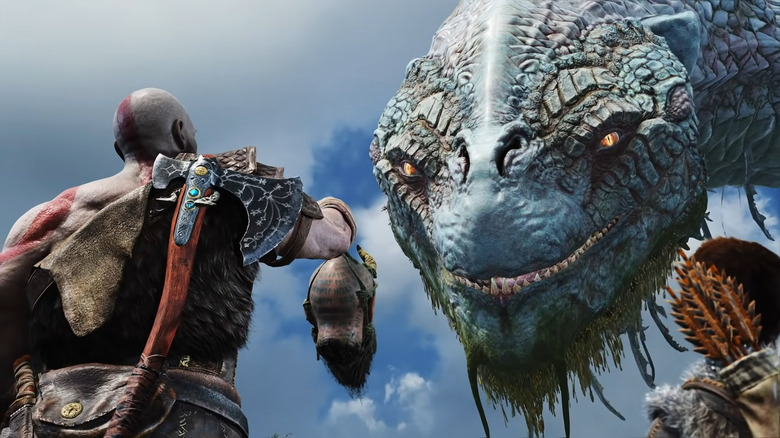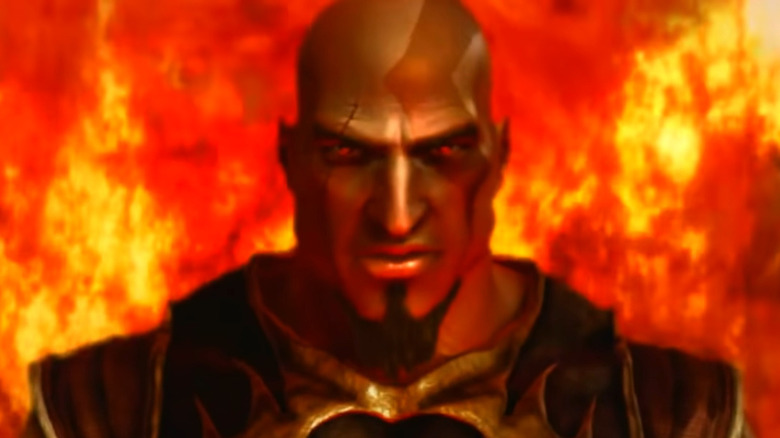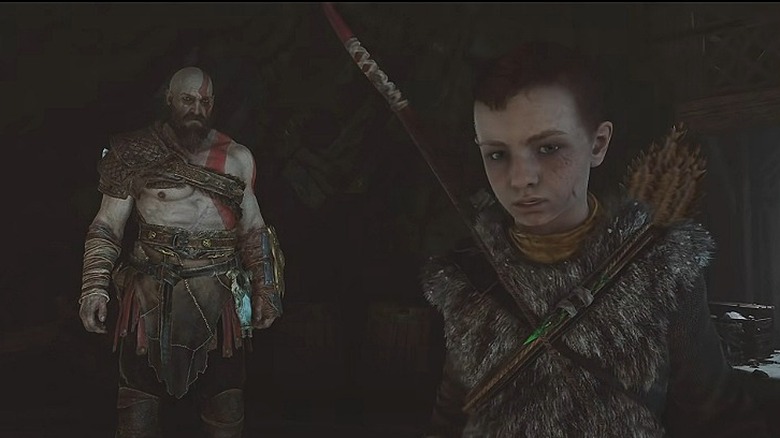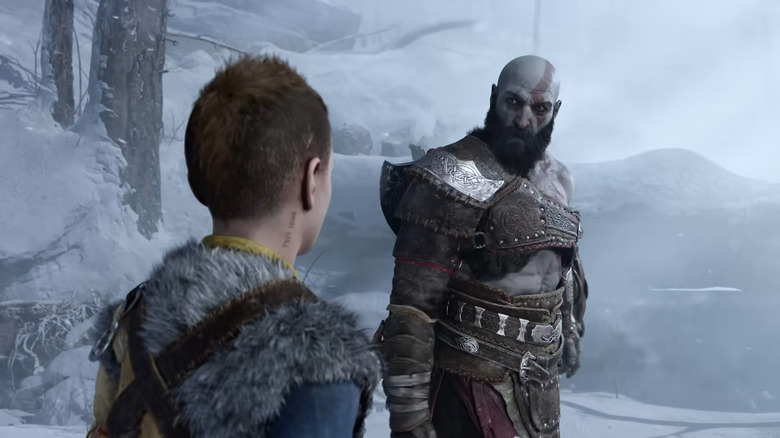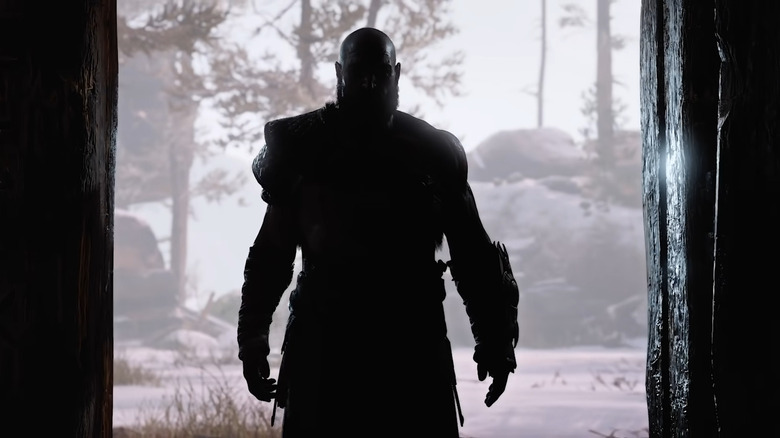The God Of War TV Series Will Adapt The 2018 Game – And That's A Weird Choice
Prime Video announced recently that its live-action adaptation of "God of War" will be focused on the 2018 entry in the video game series. Considering the most recent entry, "God of War: Ragnarök" swept this year's Game Awards with an impressive six wins, including Best Narrative, Best Score and Music (by Bear McCreary, who previously composed for Prime Video's "Rings of Power"), and Best Performance (by Christopher Judge, who voices Kratos, the titular God of War), the iron literally could not be any hotter for the striking.
The "God of War" series which, as of this writing, features nine installments, has sold over 51 million individual copies. Of that astronomical number, "Ragnarök" can claim a little over 5 million (it only released in November of this year), and approximately 23 million sales can be attributed to the 2018 entry, simply titled "God of War."
It is perhaps for this reason, then, that Prime Video's live-action production will begin with the 2018 game, which is functionally the fourth main title, the fifth being "Ragnarök." In commercial terms, sure, it makes sense to start with the highest-grossing games. More dollars means more eyes which, in turn, means more dollars again. It even might feel otherwise justified because the last two entries can be viewed as a soft reboot for the series (more on that later) but, from a narrative — and definitely a fan — standpoint, it's just a weird choice.
Kratos, the God of War
To understand why starting in the middle doesn't work here, it's important to understand the beginning. The first "God of War" game released in 2005, nearly two decades ago, where it wasted no time introducing the world to Kratos (Terrance "T.C." Carson in all but the most recent two installments), a bloodthirsty Spartan captain and demigod son of Zeus who made a fateful deal with Ares, the Greek God of War. In exchange for his servitude, the deal permitted Kratos and his soldiers to survive certain death, even bestowing the Spartan leader with his signature weapons, the fiery twin Blades of Chaos. But Ares tricked Kratos into slaughtering his wife and daughter, an act which the arrogant god believed would free his new servant from earthly ties. To add insult to injury, Kratos was cursed to bear the ashes of his dead family permanently upon his skin ... yeah, he's not just a chalky dude, that's his family. On his skin. Forever.
It would be fair to say that Kratos didn't handle his new master's betrayal particularly well. Bursting with vindictive rage and unbridled self loathing, Kratos spends subsequent games culling the Greek pantheon with brutal efficiency. Ares, Poseidon, Athena, Persephone, Hephaestus, Hera, Hades, even Zeus, all fell to Kratos' rage. Demigods, like Perseus and Theseus, and Titans, like Gaia and Helios, met their match in Kratos, as well. Some Olympians, like Artemis and Apollo, survived by steering clear of the Ghost of Sparta (a name he earned in no small part thanks to his ash-infused skin). Aphrodite chose a, uh, different approach, and survived by seducing him.
The "God of War" series very much earned its Mature ESRB rating, just as Kratos very much earned Ares' old title.
Kratos, the Dad of Boy
Despite all evidence to the contrary, the "God of War" series was, mechanically, very silly. Players were treated to a button-mashing extravaganza which often transformed the potentially traumatizing material into an addictive arcade brawler. Even the more intimate sequences (which were by no means limited to Aphrodite) were playable via rapidly pressing triangle. Granted, "God of War" also included a few puzzle and platforming sections, but the main goal of these games was always to press buttons fast and stab bad guys faster. And that worked for several games in a row, until Kratos ran out of Greek gods to kill. His mission was over: The Olympians would never again meddle with mortal lives.
Instead of laying Kratos to rest, however, Santa Monica Studio rebranded him with the 2018 "God of War," which saw an older Kratos (now voiced by Judge) retire to ancient Scandinavia, a land beneath the Nordic pantheon's purview. He switched out his lil' goatee for a luscious beard, got hitched again, and even fathered a new kid. All this Kratos wants to do is a quiet life. He's pensive and reserved. He's tired of violence and ashamed of his past. He wants nothing to do with the Aesir and the Vanir gods, rather only his cabin, his wife, and his son. Obviously, he doesn't get his wish. His new wife, Faye (voiced by Deborah Ann Woll) passes away, leaving Kratos alone with their son, Atreus (voiced by Sunny Suljic).
Whereas the previous games were about cartoonishly graphic revenge, the latest adventures are more character-based, like a dramatic story-driven film. Players are immersed in the strained-but-budding relationship between an incommunicative father and his lonely son as they come into their own, together.
A dangerous gamble
Much like how Kratos wishes to forget his past, the soft reboot of "God of War" treats the story's history like a bygone thing. Now, it's important to note that nothing here is retconned, rather only ignored as the protagonist desperately fights to bury the version of him that butchered gods. Atreus and Mimir (voiced by Alastair Duncan), the latter of which is a very sentient and very decapitated head that Kratos carries on his belt as a traveling companion a la the original mythology, serve as surrogates for new players, pressing Kratos for information — information that he rarely provides. Some of the Nordic gods are keenly aware of who Kratos is, and they're equally unenthused to engage in conversation about the Ghost of Sparta.
Despite this intentional avoidance, the gravitas of "God of War" hinges upon that history. Kratos is compelling as a reluctant father because veteran players know that he accidentally killed his daughter (Calliope, for the curious) and he's compelling as a hermit because veteran players remember his time as a lewd and rude, broody dude. Each step towards gentleness that Kratos takes is buoyed by the memory of his aptitude for the inverse. Without the pivotal context of his past, Kratos is just another gruff dad who struggles to connect with his kid, and HBO Max already has that covered with an upcoming live-action production of Naughty Dog's critically acclaimed video game, "The Last of Us."
Any faithful adaptation of the 2018 "God of War" will treat its history as a known, but unspoken, quantity, and that's incredibly difficult to do when using such a late game in the series as a launching point. This story is being told in a new medium for what might be an entirely new audience.
Reserve judgement ... for now
So, there's a legitimate possibility that Prime Video will shoehorn exposition from multiple games into its adaptation of "God of War," or, worse, treat those stories like prequel fodder. Neither option is encouraging, but there's still good reason to be excited. Despite the looming threat of poor decisions, the 2018 "God of War" is still an incredible game. The soft reboot thrilled players by clashing Greek and Nordic mythology together in one, sprawling epic. It's like if Kevin Feige and James Gunn announced a cinematic crossover between Marvel and DC ... and then promised that most of the characters would die. Look, it's not a perfect analogy.
Also, it can't be overstated just how different the last two Norse "God of War" games are from the first era, Greek mythology ones. From gameplay and graphical quality to voice cast and narrative flow, if ever there was a semi-acceptable point in Kratos' personal timeline to start a live-action adaptation that's not at the beginning, Prime Video nailed it. What's more, the last two games have an undeniable cinematic quality to them, amplified by the decision to seamlessly transition between gameplay and cut scenes in singular, continuous shots. It's unlikely for Prime Video to replicate this aspect, especially if the studio intends to backtrack and adapt the other games, which do not feature similar cinematography.
Like Kratos, be reserved. Prime Video's previous adaptations of popular media have mainly been met with mixed reception, and precious few video-game adaptations stick the landing. But, also like Kratos, who finally opens his heart (not literally, an easy mistake to make with this guy), be hopeful. If Prime Video does even half of "God of War" justice, we're in for one "Hel" of a ride.
